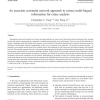Free Online Productivity Tools
i2Speak
i2Symbol
i2OCR
iTex2Img
iWeb2Print
iWeb2Shot
i2Type
iPdf2Split
iPdf2Merge
i2Bopomofo
i2Arabic
i2Style
i2Image
i2PDF
iLatex2Rtf
Sci2ools
DSS
2007
2007
An associate constraint network approach to extract multi-lingual information for crime analysis
International crime and terrorism have drawn increasing attention in recent years. Retrieving relevant information from criminal records and suspect communications is important in combating international crime and terrorism. However, most of this information is written in languages other than English and is stored in various locations. Information sharing between countries therefore presents the challenge of cross-lingual semantic interoperability. In this work, we propose a new approach – the associate constraint network – to generate a cross-lingual concept space from a parallel corpus, and benchmark it with a previously developed technique, the Hopfield network. The associate constraint network is a constraint programming based algorithm, and the problem of generating the cross-lingual concept space is formulated as a constraint satisfaction problem. Nodes and arcs in an associate constraint network represent extracted terms from parallel corpora and their associations. Constra...
| Added | 13 Dec 2010 |
| Updated | 13 Dec 2010 |
| Type | Journal |
| Year | 2007 |
| Where | DSS |
| Authors | Christopher C. Yang, Kar Wing Li |
Comments (0)

